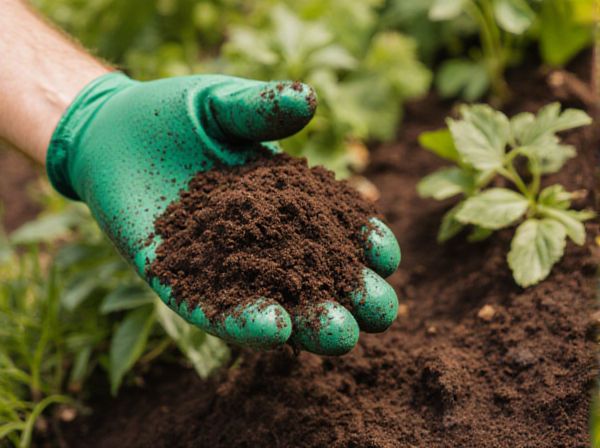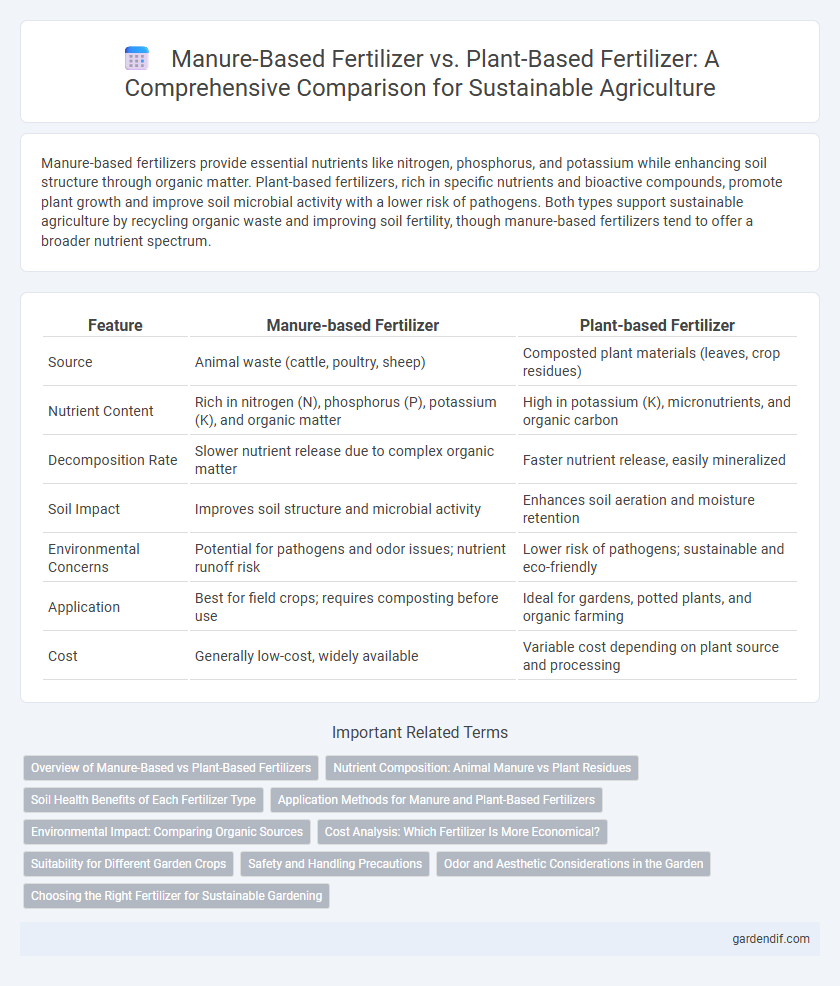
Manure-based fertilizer vs plant-based fertilizer Illustration
Manure-based fertilizers provide essential nutrients like nitrogen, phosphorus, and potassium while enhancing soil structure through organic matter. Plant-based fertilizers, rich in specific nutrients and bioactive compounds, promote plant growth and improve soil microbial activity with a lower risk of pathogens. Both types support sustainable agriculture by recycling organic waste and improving soil fertility, though manure-based fertilizers tend to offer a broader nutrient spectrum.
Table of Comparison
| Feature | Manure-based Fertilizer | Plant-based Fertilizer |
|---|---|---|
| Source | Animal waste (cattle, poultry, sheep) | Composted plant materials (leaves, crop residues) |
| Nutrient Content | Rich in nitrogen (N), phosphorus (P), potassium (K), and organic matter | High in potassium (K), micronutrients, and organic carbon |
| Decomposition Rate | Slower nutrient release due to complex organic matter | Faster nutrient release, easily mineralized |
| Soil Impact | Improves soil structure and microbial activity | Enhances soil aeration and moisture retention |
| Environmental Concerns | Potential for pathogens and odor issues; nutrient runoff risk | Lower risk of pathogens; sustainable and eco-friendly |
| Application | Best for field crops; requires composting before use | Ideal for gardens, potted plants, and organic farming |
| Cost | Generally low-cost, widely available | Variable cost depending on plant source and processing |
Overview of Manure-Based vs Plant-Based Fertilizers
Manure-based fertilizers are rich in nitrogen, phosphorus, and potassium, providing essential nutrients that enhance soil fertility and microbial activity, making them ideal for improving soil structure and nutrient retention. Plant-based fertilizers primarily supply organic matter and trace minerals, promoting soil aeration and water retention while supporting sustainable agriculture through renewable sources. Both types offer distinct advantages, with manure-based fertilizers ensuring quick nutrient availability and plant-based options fostering long-term soil health and environmental benefits.
Nutrient Composition: Animal Manure vs Plant Residues
Animal manure fertilizer contains a rich blend of essential nutrients such as nitrogen, phosphorus, potassium, and micronutrients derived from the digestive processes of livestock, providing a well-balanced nutrient profile. Plant-based fertilizers primarily supply nitrogen and organic matter, with lower concentrations of phosphorus and potassium compared to manure, impacting their nutrient release rates and soil enrichment capacity. The nutrient composition of animal manure supports improved soil fertility and microbial activity, while plant residues contribute more to soil structure and carbon content but offer less immediate nutrient availability.
Soil Health Benefits of Each Fertilizer Type
Manure-based fertilizer enriches soil with organic matter and beneficial microbes, enhancing nutrient retention and promoting microbial diversity critical for soil health. Plant-based fertilizers release nutrients more slowly and improve soil structure by adding organic carbon, which supports water retention and aeration. Both types contribute to sustainable soil fertility, but manure-based options tend to boost microbial activity more significantly, while plant-based fertilizers excel in improving soil physical properties.
Application Methods for Manure and Plant-Based Fertilizers
Manure-based fertilizers require application methods such as spreading, incorporation, or injection directly into the soil to enhance nutrient availability and reduce nitrogen volatilization. Plant-based fertilizers are commonly applied through top-dressing, foliar sprays, or soil incorporation to improve organic matter content and stimulate microbial activity. Both fertilizers benefit from precision application techniques to optimize nutrient uptake and minimize environmental impact.
Environmental Impact: Comparing Organic Sources
Manure-based fertilizers release essential nutrients slowly, enhancing soil fertility while improving microbial activity and organic matter content, but they can contribute to greenhouse gas emissions and nutrient runoff if not managed properly. Plant-based fertilizers, derived from composted crop residues and cover crops, promote sustainable nutrient cycling with lower carbon footprints and reduced risks of water contamination. Both types support organic farming, yet plant-based options often offer better environmental benefits through faster renewal rates and minimized pollutant release.
Cost Analysis: Which Fertilizer Is More Economical?
Manure-based fertilizers often present a more cost-effective option due to their nutrient-rich composition and availability as agricultural byproducts, reducing the need for synthetic inputs. Plant-based fertilizers can be more expensive, especially when derived from specialized crops or processed organic matter, but they offer benefits such as improved soil structure and slow nutrient release. Evaluating local availability and application requirements is essential to determine the most economical choice for sustainable crop production.
Suitability for Different Garden Crops
Manure-based fertilizer is highly suitable for nutrient-demanding crops like tomatoes, corn, and leafy greens due to its rich nitrogen, phosphorus, and potassium content that enhances soil fertility and structure. Plant-based fertilizers, derived from sources such as seaweed or alfalfa, provide a more balanced nutrient profile ideal for root vegetables, herbs, and flowers, promoting steady growth and improved disease resistance. Selecting the appropriate fertilizer type depends on the specific nutrient requirements and growth habits of garden crops to optimize yield and soil health.
Safety and Handling Precautions
Manure-based fertilizers require careful handling due to potential pathogens and higher nitrogen content, necessitating proper composting and storage to minimize health risks and environmental contamination. Plant-based fertilizers typically offer safer handling with lower risk of pathogens and are less likely to cause burns or nutrient imbalances during application. Both types benefit from using protective gear and following recommended application rates to ensure safe use and effective nutrient delivery.
Odor and Aesthetic Considerations in the Garden
Manure-based fertilizers often emit strong, pungent odors that can deter outdoor activity and affect garden aesthetics, especially in residential areas. Plant-based fertilizers typically produce minimal to no odor, making them more suitable for maintaining a pleasant garden environment. Visually, manure may cause uneven soil texture and discoloration, while plant-based options blend more naturally with garden soil, enhancing overall appearance.
Choosing the Right Fertilizer for Sustainable Gardening
Manure-based fertilizers offer rich nitrogen, phosphorus, and potassium essential for soil fertility while improving soil structure and microbial activity, making them ideal for vegetable gardens and heavy feeders. Plant-based fertilizers, derived from organic materials like seaweed or composted crop residues, provide a balanced nutrient release and enhance soil organic matter, supporting long-term soil health and sustainable growth for flowers and herbs. Selecting the right fertilizer depends on the specific nutrient needs of your plants and soil test results, emphasizing sustainability by minimizing chemical inputs and promoting natural soil enrichment.
Manure-based fertilizer vs plant-based fertilizer Infographic

 gardendif.com
gardendif.com